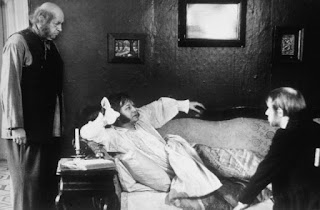Oblomov by Ivan Goncharov, Russia, 1859
 A fairy story, a moral fable, a farce…? If a farce entertains through exaggerated (and improbable) situations, then the novel probably should not be called a farce; nor is it pure satire, where shortcomings are pinpointed and ridiculed with the purpose of shaming specific people and/or groups into improvement. Although Oblomovis a mixture of a fable, a fairy story and a farce, in essence it is a very real observation of the process of change and how change collects both victims and victors.
A fairy story, a moral fable, a farce…? If a farce entertains through exaggerated (and improbable) situations, then the novel probably should not be called a farce; nor is it pure satire, where shortcomings are pinpointed and ridiculed with the purpose of shaming specific people and/or groups into improvement. Although Oblomovis a mixture of a fable, a fairy story and a farce, in essence it is a very real observation of the process of change and how change collects both victims and victors.The novel iswell written and, in spite of its 586 pages, is easy to read. On the surfaceit is about a man – Oblomov, a Russian nobleman– who does not want to do anything else but sleep. Backward glimpses give the reader some idea of why Oblomov, in his early thirties at the beginning of the book, is quite content to remain tucked up in his bed for the better part of the day. He is lazy, but he also cannot see any reason for doing anything: he is not interested in social activities; he is not interested in reading; he is not interested in travelling. He has a friend Stolz, who is the complete opposite and who does all in his power to rouse Oblomov from his inactive and wasteful life.
Some could well argue that Oblomov is a depressive, and yet he seems happy doing what he is doing, that is to say, nothing.
 If one chooses to regard it as a satire of the Russian ruling class, then Oblomov probably represents the laziness of people used to having everything done for them – people without any particular ambition beyond holding on to the status quo. They are unable to make active, important decisions, because there has always been someone to make such decisions for them, but as society changes it becomes obvious that they are no longer needed: they are superfluous. Life around them is waking up; there are new ideas and new opportunities. The ordinary person is beginning to see the possibility of a very different kind of life for himself, and there is a very big danger that the aristocracy will be left behind.
If one chooses to regard it as a satire of the Russian ruling class, then Oblomov probably represents the laziness of people used to having everything done for them – people without any particular ambition beyond holding on to the status quo. They are unable to make active, important decisions, because there has always been someone to make such decisions for them, but as society changes it becomes obvious that they are no longer needed: they are superfluous. Life around them is waking up; there are new ideas and new opportunities. The ordinary person is beginning to see the possibility of a very different kind of life for himself, and there is a very big danger that the aristocracy will be left behind.There are two women in the novel, Olga and Agafya: Olga symbolizes the possible, exciting – yet somewhat daunting – future, while Agafya embodies the security of the past. Oblomov wants to be able to embrace everything that Olga is promising him, but he is too securely tied to the past. He has never learnt how to take a step into the unknown, and now when he needs to he is hesitant and indecisive.
Oblomov’s servant, Zahar, epitomizes the peasant class. In the same way that Oblomov has spent his life being waited upon, Zahar has spent his life doing the waiting (not always without complaint). In spite of the indications of change, neither of them is prepared to take such a step – not even Agafya is able to embrace change – however, with her woman’s intuition, she knows that change will happen and that it will be a reality if not for her generation then for the generations that come after her.
However the book is read – as a satire, a fairy tale or simply as a novel about a man who did not want to do anything – it gives many interesting glimpses of Russia in the mid-nineteenth century. A small gem that provokes thought, sadness and, occasionally, humour.
The film still is from www.cinema.de
